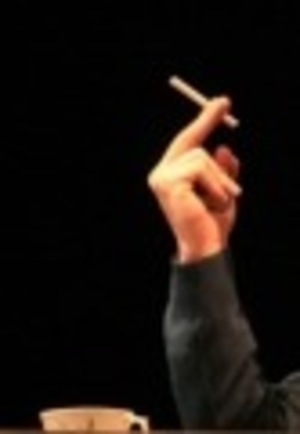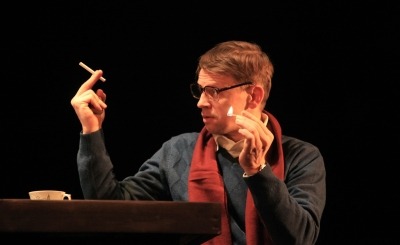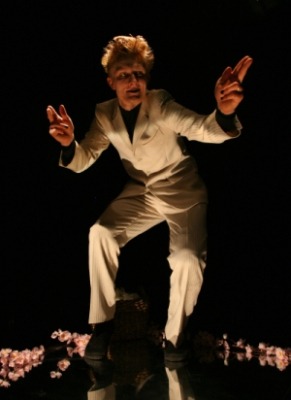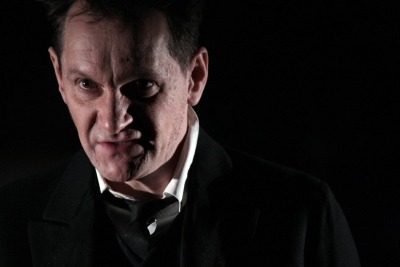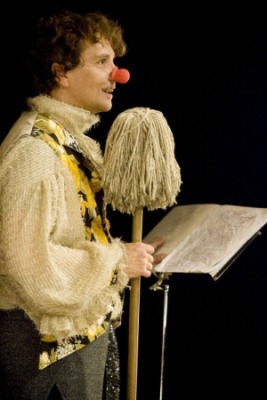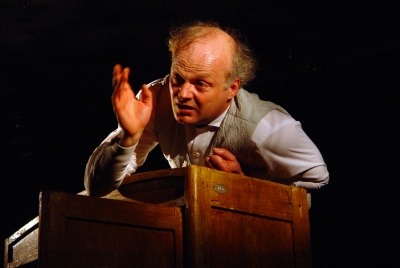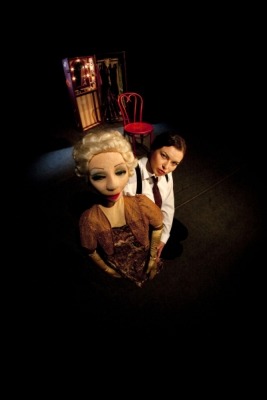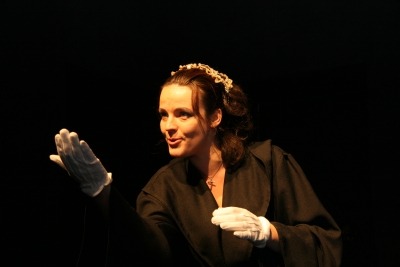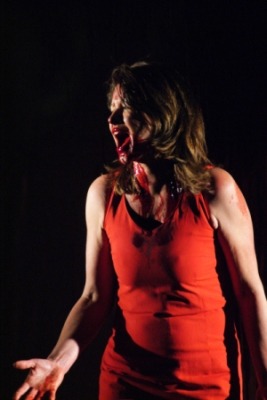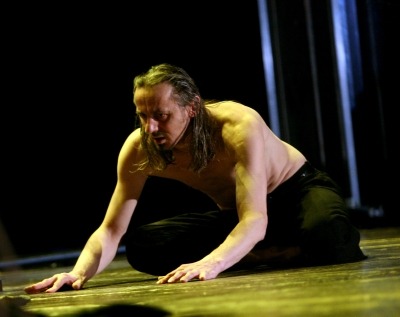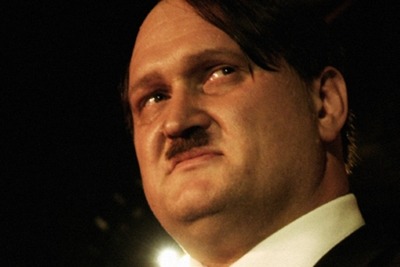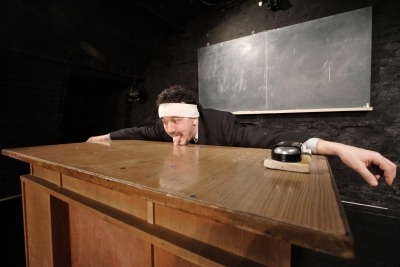“MONOBALTIC” – BRIGHT MARK OF BITE ON THE BODY OF CULTURE 0
Vaiva Grainytė
www.kamane.lt, 2010 05 13
In brief: The international one-actor’s theatre festival “MonoBaltic”, which finished recently, started only two days after the jubilee Kaunas Jazz Festival representing Kaunas. “MonoBaltic“ could be called a festival-child as compared with the famous lord Kaunas Jazz; still, the festival calculating its second year only has strong and sharp teeth that left a bright mark on the cultural body of the city in four days.
The family of Kaunas Chamber Theatre with the director Stanislovas Rubinovas and actor Aleksandras Rubinovas at the head organised the disgorge of wider theatre waters and context into chamber theatre halls of Kaunas. Actors stepping on the stage one by one revealed the possibilities of a mono-performance based on musical, poetry, social, plastic and classical works.
N.Narmontaitė. "Selavy"
The festival started with the presentation of Lithuanian, local context. It was represented by mono-performances of Nijolė Narmontaitė and Rolandas Kazlas. The actress N.Narmontaitė invited a quartet of musicians to the performance “Selavy!” created by Violeta Sagaitytė and Nijolė Narmontaitė. The plot of the performance was about an artistic girl who became an actress. The performance had many autobiographical details of life of N.Narmontaitė. Also, the performance was similar to the tribune, from which N.Narmontaitė stated how the audience was important and dear to her as an actress.
R.Kazlas. "Iron and Silver"
The actor Rolandas Kazlas finished his mono-performance “Iron and Silver” according to poetry of Vladas Šimkus by gratitude to the audience, without which theatre would not exist, too. The stage version of V.Šimkus’ poems was a discovery for the majority of spectators: the action of the performance is born from different poems that remind snappy pun. The character of R.Kazlas is a man from the crowd who finds himself on the stage accidentally and reveals the depth and heart of V.Šimkus’ poetry. The performance “Iron and Silver” received the second place at the decision of the jury.
T.Vasama. "Ode to Love"
The third award was granted to the relative of “Iron and Silver" by the genre - the mono-performance-monologue of the Finnish actor Tuukka Vasama according to poems of the Finnish poet Toumo Timonen. Here poetry and text is used as gunpowder for shooting the bullets of emotional and physical expression. Tuukka Vasama performs his “Ode to Love” on a table covered by a mirror, at the distance of only 20-30 cm from the audience sitting around.
J.Kraskov. "Madman's Notes"
As for the performance “Madman’s Notes” created by the famous Russian E.Vachtangov Theatre actor Jurij Kraskov according to the story of Nikolaj Gogol of the same title, we see the case of the text conversion into theatre material again. The grotesque work of N.Gogol is materialised using precise intonations of the actor, plastics and fragments of works of P. Tchaikovsky and R. Shchedrin played by the piano by the emeritus Russian artist Natalija Gavrilova.
When analysing the performances of “MonoBaltic”, the author searches for parallels and common features. Therefore, she places two performances of different origin “Stories of Goruchin Village” and “Comic Tragedy” side by side.
R.Westberg. "Comic Tragedy"
The Swedish actor Roder Westberg, who astounded the audience by the talented version of “Hamlet” last year, showed the play of Yves Hunstad and Eve Bonfant staged by the director Peter Engkvist “Comic Tragedy”. It is a philosophical, comic and poetic representation of an actor’s kitchen. Pantomime technique is used in virtuoso manner in the performance. The audience sees quarrels of the actor and his character, as well as playful conflict situations.
S.Barkovskij. "Story of Goruchin Village“
Meanwhile, “Story of Goruchin Village” is performed by the emeritus Russian actor Sergej Barkovski. It is a performance the epicentre of which is the actor’s charisma and the highest level of improvisation. The performance created by Andrej Andrejev according to the hardly known work of Aleksandr Pushkin becomes the staging of a manuscript of the writer Ivan Petrovich Belkin. The writer embodied by S.Barkovski succeeds to line all characters of the village in front of the audience (using puppets and wooden sculptures), to render the flow of time, and materialise the process of creative pain.
A.Skubik. "Broken Nails. Marlene Dietrich"
The mono-performance of the actress Anna Skubik “Broken Nails. Marlene Dietrich“ shown two days after the performance of N.Narmontaitė “Selavy!” opposes the tears full of pathos of the latter dedicated to the beloved audience. The actress of the puppet theatre from Poland asserts a completely different, tragic and drastic, relation of a celebrity and the audience.
K.Klētniece. "Lady Capulet"
The mono-performance of the Latvian actress Krīstine Klētniece “Lady Capulet“ intrigued: the programme announced that it would be shown what the mother of the young Juliet did after the daughter’s death. The fate of Lady Capulet attracted the attention of the playwright Nina Mazur and the Ukrainian Irinai Klishchevskaja who directed the play.
G.Schelle. "Fedra's Dreams"
The German actress Gaby Scelle also embodied a classical character – Fedra of Euripides in her performance "Fedra's Dreams". The queen who fell in love with her husband’s son experiences love without response.
J.Stolarski. "Code"
The performance of plastics of the Polish actor Janusz Stolarski “Code” may be accepted or rejected. The body moving inside the circle drawn by chalk is forced to move by existential questions. The actor who says no word speaks by his body moving according to sacred music. Some spectators hear his language while others don’t. The relation (or the lack of it) with J.Stolarski’s plastic philosophy appears depending on the fact whether a spectator asks himself similar questions at that time.
I.Taalmaa. "Adolf"
The mono-performance of the Estonian actor Indrek Taalmaa “Adolf“ is direct and precise. The performance starts with the fiery Hitler’s monologue in a bunker. Then I.Taalmaa tears off the moustache from the face unexpectedly and leaves his role asking the audience for a smoke and a drink. Subsequently, after a short break, the actor returns to the stage as a statistical man of these days spreading homophobic, racist and sexist statements. The performance is a snappy and precise comment on the situation of today.
P.Scherer. "Klamm's War". Photos from monobaltija.lt
The mono-performance of the Hungarian actor Pйter Scherer “Klamm’s War“ according to the play of Kai Hensel was awarded with the first prize in the festival. The performance staged by the director Jána Novák also became the favourite of the audience. The actor P.Scherer undertook the complicated role of a teacher. The spectators of “Klamm’s War“ become pupils, the silent enemies of the teacher. The neurotic and sarcastic character acted by P.Scherer reveals the closet of his soul full of fears, hatred, contempt and desperation. The lesson is a complicated psychological polyphony formed of sarcasm, philosophy, comic and grotesque moments.
In summary, the range of moments of "MonoBaltic” is very wide: the festival-child encompassed twelve performances different by genre and theme in five days. Many of them may be called discoveries of the theatre. One could only wish that miracles shown in chamber halls would reach a bigger circle of audience. The author's wish is without any pathos, based on the objective evaluation of the trace of the child’s bite on the cultural body of the city: it was bright and of high quality.
